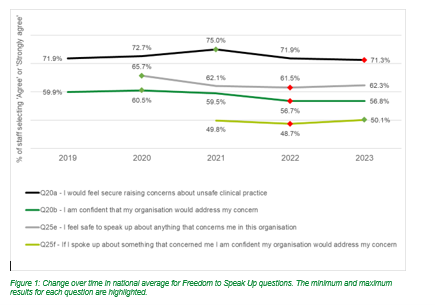National Guardian fears for safety of patients if NHS workers’ concerns are not addressed
“The NHS may be broken, but by listening to our people, we can begin to fix it,” says Dr Jayne Chidgey-Clark
Press release
24 July 2024
“The NHS may be broken, but by listening to our people, we can begin to fix it,” says Dr Jayne Chidgey-Clark
The National Guardian’s Office today (24 July 2024) published its analysis of the questions relating to speaking up in the 2023 NHS Staff Survey.
The analysis of the 2023 NHS Staff Survey by the National Guardian’s Office reveals a decline in workers feeling secure raising concerns about unsafe clinical practice for the second consecutive year.
While workers’ confidence in speaking up about anything which concerns them showed signs of improvement, the survey revealed a five-year low in the number of respondents who feel secure raising concerns about unsafe clinical practice.
The confidence of medical professionals to raise clinical safety concerns has declined by around six percentage points since 2021 (69.4% in 2023 compared to 75.1% in 2021). This is declining for medics at all stages of their career (both those in training and consultants).
The Freedom to Speak Up sub-score, which measures NHS workers’ confidence in speaking up, remained stable this year at 6.46, a slight improvement from 2022 (6.44). The sub-score is comprised of two sets of questions relating to raising and addressing concerns about unsafe clinical practice (questions 20a and 20b) and anything of concern (questions 25e and 25f).
While the results have improved since the 2015 Freedom to Speak Up Review and resulting actions, this data continues the fall in NHS workers’ confidence to speak up since the pandemic. However, Freedom to Speak Up guardians are seeing an increase in the numbers of cases being raised with them, which may signify that other speaking up routes are not effective or trusted.
Dr Jayne Chidgey-Clark, National Guardian for the NHS said: “This deterioration in confidence has implications for patient safety. These figures must focus the minds of those who lead healthcare organisations. If your people feel they cannot speak up about matters affecting patient care, or if they do, nothing will happen, how can you be assured that you are delivering your best for patients?
“When workers have a good experience when they speak up, they share that experience and we will begin to change the conversation of what it means to speak up in healthcare. The NHS may be broken, but by listening to our people, we can begin to fix it.”
For more information or interviews contact: comms@nationalguardianoffice.org.uk
>ENDS<
Notes for editors:
About the Report
Listening to the Silence: What does the Staff Survey tell us about speaking up in the NHS?
Published : 24 July 2024
Available from: www.nationalguardian.org.uk
Key Findings
- The Freedom to Speak Up sub-score has remained stable this year, showing very slight improvement from 6.44 in 2022 to 6.46 in 2023.
- There has been minimal change in the confidence levels of workers to speak up about concerns and feel they will be addressed by organisations.
- In the 2023 survey the clinical practice questions are showing signs of decline with ‘I would feel secure raising concerns about unsafe clinical practice’ now being at a five-year low. 71.3% of respondents said they felt safe to speak up about unsafe clinical practice and 56.8% thought that their organisation would address such concerns.
- Questions about any concerns have stabilised and are starting to show improvements. 62.3% of respondents said they felt safe to speak up about anything and 50.1% thought that their organisation would address such concerns.
The Freedom to Speak Up sub-score
A Freedom to Speak Up sub-score (called the Raising Concerns sub-score in NHS Staff Survey reports) has been calculated since 2021 and can be used as a benchmark. For the 2023 NHS Staff Survey the sub-score was calculated from 670,306 worker responses.
The sub-score is comprised of two sets of questions:
- Raising and addressing concerns about unsafe clinical practice (questions 20a and 20b)
- Raising and addressing concerns about anything (questions 25e and 25f)
There were some parts of the NHS workforce where improvement in worker perceptions of speaking up was identified:
- The Freedom to Speak Up sub-score for ambulance trusts has markedly improved from 5.83 in 2022 to 5.96 in 2023.
- The sub-score has also markedly improved for the past two years for midwives, from 5.94 in 2021 to 6.30 in 2023.
There were some parts of the workforce where perceptions of speaking up seem to be declining:
- Medical and dental worker confidence in raising clinical safety concerns has declined by around six (5.7) percentage points since 2021.
- The Freedom to Speak Up sub-score for the ‘general management’ occupational group has worsened for the past two years. This is despite workers indicating that they feel more supported by their immediate managers.
- The Freedom to Speak Up sub-score for workers with a long-lasting condition or illness (6.08) is markedly lower than for those workers who do not have a long-lasting condition or illness (6.60).
About the NHS Staff Survey
In the 2023 Staff Survey, 678,676 workers (49.7% response rate) shared their experience of working within the NHS. The results are representative of those who answered the 2023 NHS Staff Survey, not the full workforce in these organisations.
For the second year, a survey for bank only workers was also undertaken and included the same four questions relating to speaking up as in the core survey. 25,865 bank workers from 152 Trusts completed the survey in 2023, an 18% response rate.
A national General Practice Staff Survey (GPSS) was rolled out for the first time in 2023. Results are not published but are released directly to organisations and ICBs.
Most Improved Freedom to Speak Up sub-scores for Trusts in the NHS Staff Survey 2023
|
Organisation |
Benchmark group |
Freedom to Speak Up sub-score 2023 |
Change from 2022 sub-score |
|
South East Coast Ambulance Service NHS Foundation Trust |
Ambulance |
5.73 |
+0.43 |
|
Greater Manchester Mental Health NHS Foundation Trust |
Mental Health & Learning Disabilities and Mental Health, Learning Disabilities & Community |
6.41 |
+0.33 |
|
London Ambulance Service NHS Trust |
Ambulance |
6.14 |
+0.30 |
|
The Hillingdon Hospitals NHS Foundation Trust |
Acute & Acute Community |
6.28 |
+0.25 |
|
North Middlesex University Hospital NHS Trust |
Acute & Acute Community |
6.36 |
+0.25 |
|
The Shrewsbury and Telford Hospital NHS Trust |
Acute & Acute Community |
6.07 |
+0.25 |
|
University Hospitals of North Midlands NHS Trust |
Acute & Acute Community |
6.30 |
+0.23 |
|
Royal Cornwall Hospitals NHS Trust |
Acute & Acute Community |
6.39 |
+0.23 |
|
Salisbury NHS Foundation Trust |
Acute & Acute Community |
6.38 |
+0.23 |
|
North Bristol NHS Trust |
Acute & Acute Community |
6.60 |
+0.23 |
About the National Guardian’s Office
The National Guardian’s Office works to make speaking up become business as usual to effect cultural change in the NHS.
The office leads, trains and supports a network of Freedom to Speak Up Guardians in England and provides learning and challenge on speaking up matters to the healthcare system as a whole.
The role of Freedom to Speak Up guardians and the National Guardian were established in 2016 following the events at Mid-Staffordshire NHS Foundation Trust and recommendations from Sir Robert Francis’ Freedom to Speak Up Inquiry.
There are now over 1,200 Freedom to Speak Up guardians in NHS primary and secondary care and independent sector organisations, national bodies and elsewhere that ensure workers can speak up about anything which has an impact on their ability to do their job.
About Freedom to Speak Up Guardians
Freedom to Speak Up guardians support workers to speak up when they feel that they are unable to do so by other ways. They ensure that people who speak up are thanked, that the issues they raise are responded to, and make sure that the person speaking up receives feedback on the actions taken. Guardians also work proactively to support their organisation to tackle barriers to speaking up.
About the National Guardian for the NHS
Dr Jayne Chidgey-Clark was appointed as National Guardian in December 2021.
She is a registered nurse with more than 30 years’ experience in healthcare.
She has experience in the NHS, higher education, voluntary and private sectors, as a nurse, leader, board member – as director and non-executive director – and a Freedom to Speak Up Guardian.
Her specialist clinical area is end of life care in which she was awarded her PhD. She is the Independent Chair for the Oxfordshire Safeguarding Adults Board
Press release distributed by Pressat on behalf of National Guardian's Office, on Wednesday 24 July, 2024. For more information subscribe and follow https://pressat.co.uk/
NHS Whistleblowing Speak Up Charities & non-profits Education & Human Resources Government Health Public Sector & Legal
Published By

0191 249 4400
enquiries@nationalguardianoffice.org.uk
https://www.nationalguardian.org.uk
comms@nationalguardianoffice.org.uk
Visit Newsroom
You just read:
National Guardian fears for safety of patients if NHS workers’ concerns are not addressed
News from this source:



